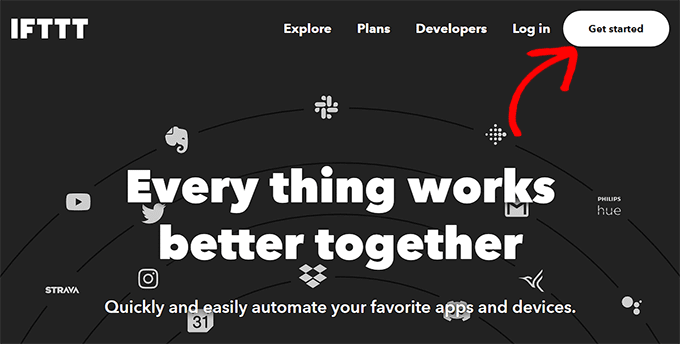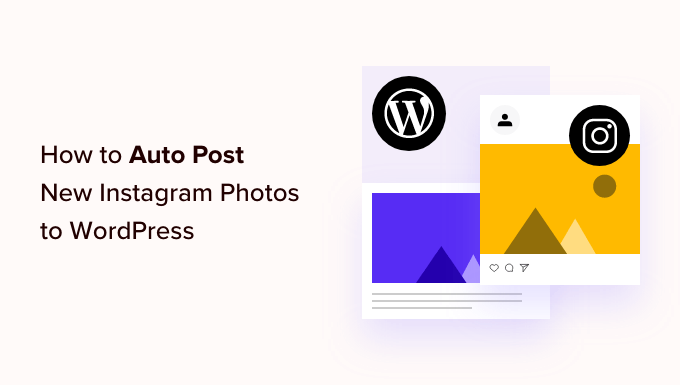Are you looking for a way to automatically post new Instagram photos on your WordPress site?
By adding new Instagram photos to your website, you can increase brand exposure and even drive more traffic to your Instagram account. These photos can also make your WordPress website more attractive and interactive.
In this article, we will show you how to automatically post new Instagram photos to WordPress, step by step.
Why Post Instagram Photos to WordPress?
Instagram has over 2 billion monthly active users, and it allows people to share videos and images on the social media platform. It even lets people discover new user accounts based on what they already like.
If you already have a WordPress website and just started using Instagram, then you can easily gain more followers by posting your new Instagram photos on your website.
This can help you build social proof by showing that you are active on Instagram, interact with your audience on the platform, and increase the amount of time visitors spend on your site.
That being said, let’s take a look at how to easily and automatically post new Instagram photos to WordPress. You can use the quick links below to jump to the different methods:
Method 1: Add Instagram Photo as a New Post in WordPress
This method is for users who want to create a new blog post showing their latest Instagram photo.
You can easily do this using IFTTT (If This Then That), which is a powerful tool that lets you automate your WordPress site with social media.
First, you need to visit the IFTTT website and click on the ‘Get Started’ button in the top right corner of the screen.

After that, you have to log in or create your new account on the website.
Once you’ve done that, just visit your IFTTT dashboard and click the ‘Create’ button in the top right corner to start building an applet.

This will take you to a new page where you have to configure the trigger and action settings.
You can start by clicking on the ‘Add’ button next to the ‘If This’ option.

You will then be directed to the ‘Choose a service’ page, where you have to select a platform for the trigger.
If you want to publish a blog post every time a new photo is uploaded to your Instagram account, then you will have to select Instagram as the service.

This will take you to the ‘Choose a trigger’ page.
From here, simply choose the ‘Any new photo by you’ option as the trigger.

You will now be taken to the ‘Connect Service’ page, where you have to connect your Instagram account to IFTTT.
To do this, just click the ‘Connect’ button.

This will open an Instagram prompt in a new window where you have to log in to your account.
Once you do that, IFTTT will ask for permission to receive your Instagram account media information. Simply toggle on the ‘Media’ switch and click the ‘Allow’ button.

You will now be redirected to the IFTTT page, where your Instagram account has been connected.
From here, click the ‘Create trigger’ button to complete the process.

Now that your trigger has been created, it’s time to create the action. This is what will happen after the trigger occurs.
For this, you have to click the ‘Add’ button next to the ‘Then That’ option.

You will again be directed to the ‘Choose a service’ page.
This time, find and select WordPress as your service.

Now, you will be taken to the ‘Choose an action’ page, where you have to select an action that your website will take once the trigger happens.
From here, you need to choose the ‘Create a photo post’ option as the action.

This will take you to a new page where you will have to add your website URL and login details to connect it with IFTTT.
Once you have done that, simply click the ‘Create action’ button at the bottom of the page.

You will now be directed to the new screen, where you will be able to see the trigger and action that you have created using IFTTT.
If you want, you can also edit these actions by clicking on the ‘Edit’ link. However, if you don’t want to make any changes, then simply click the ‘Continue’ button.

This will take you to a new screen where you can change your applet title and toggle the switch if you want to receive a notification every time this applet is used.
Finally, click the ‘Finish’ button.

You can now post a new photo to your Instagram account, and it will be automatically posted to your WordPress site.
This is what it looked like on our demo WordPress blog.

Method 2: Display Your Instagram Feed on Your WordPress Site
This method is for users who just want to show their Instagram feeds on their WordPress websites without creating new blog posts.
You can easily do this using the Instagram Feed plugin by Smash Balloon. It is the best WordPress Instagram plugin that allows you to easily add your Instagram feed to any page or post.
First, you need to install and activate the Instagram Feed plugin. For more details, see our step-by-step guide on how to install a WordPress plugin.
Note: The Instagram Feed plugin also has a free version. However, we will be using the paid plan for this tutorial as it has more customization options.
Upon activation, head over to the Instagram Feed » Settings page from the WordPress admin sidebar to enter your license key.
You can find this information in your account on the Smash Balloon website.

Once you have done that, you need to visit the Instagram Feed » All Feeds page from the WordPress dashboard.
Here, click the ‘+ Add New’ button to start embedding your Instagram feed.

You’ll now be directed to the ‘Create an Instagram Feed’ screen, where you must select the ‘User Timeline’ option as the feed type.
This means that Smash Balloon will now directly fetch posts for the feed from your Instagram account and update the feed automatically once you post new photos.
After that, click the ‘Next’ button to continue.

Once you do that, you will be taken to the ‘Select one or more sources’ page.
To connect your Instagram account to your website, just click the ‘+ Add Source’ button.

This will direct you to the Smash Balloon website, where you will be asked to select your Instagram account type.
Keep in mind that if you have a personal Instagram account, then Smash Balloon will automatically connect your website with it.
However, if you have a business Instagram account, then it must be connected to your Facebook page, which will then be connected with Smash Balloon.
For this tutorial, we will be selecting the ‘Personal’ option.

Now, you will be taken to the next step.
Here, you have to click on the ‘Connect with Instagram’ button to move forward.

The Instagram platform will open up on the screen, and you will have to log in to your account.
Once you have done that, Smash Balloon will ask for your permission to collect data from your Instagram account. Simply click the ‘Allow’ button.

You have now successfully connected your Instagram account to your website.
Now, you need to pick your account and click the ‘Next’ button on the ‘Select one or more sources’ page.

This will direct you to the ‘Start with a template’ page, where you can choose any of the premade templates offered by Smash Balloon for your Instagram photo feed.
After that, click the ‘Next’ button.

The plugin will now load your Instagram feed in its live preview editor. Here, you will notice a feed preview on the right side and the settings column on the left side of the screen.
To start customizing your Instagram feed, click on the ‘Layout’ tab.

This will open some settings in the left column, where you can change your layout to carousel, grid, highlight, or masonry.
Keep in mind that if you are using the free plugin, then some of the customization options may be locked for you.
Once you have done that, you can also configure the feed’s height, padding, and the number of posts that will be displayed in the feed from here.

Next, click on the ‘Color Scheme’ tab from the left column.
You can keep your Instagram feed in light or dark mode or even create your own custom color scheme for it by choosing the ‘Custom’ option.

After that, click on the ‘Posts’ tab from the left column.
Here, you can customize the individual post types, backgrounds, borders, and post radius.

Next, you can click on the ‘Load More Button’ or ‘Follow Button’ tabs to add those buttons to your feeds.
For more details on customization settings, please see our tutorial on how to easily embed Instagram in WordPress.
Finally, click the ‘Save’ button at the top to store your settings.

Now, it’s time for you to embed your Instagram feed on a WordPress page or post.
To do this, visit the Instagram Feed » All Feeds page from the WordPress dashboard.
Once you are there, just copy the shortcode for the Instagram feed that you created.

After that, open a WordPress page or post of your liking in the block editor.
From here, click the add block ‘+’ button in the top left corner of the screen to add the Instagram Feed block.
Next, paste the shortcode you copied earlier into the ‘Shortcode Settings’ section.

Finally, click the ‘Update’ or ‘Publish’ button to store your settings.
You can now visit your WordPress site to view the Instagram feed in action.

Bonus: Create an Image Gallery in WordPress
Embedding your Instagram feed on your website is just one way to show off your photography. Alternatively, you can create your own image gallery in WordPress.
This can be extremely helpful if you have a photography website or sell images using Easy Digital Downloads. It can also make your website look more attractive in general.
Plus, if you have an online store, then creating a gallery for product images can help you display all your products in one place and help boost sales.
Envira Gallery is the best plugin for adding an attractive image gallery to your WordPress website.

It is the best WordPress gallery plugin that comes with a drag-and-drop builder, premade gallery templates, social sharing, image compression, watermarking, pagination, and so much more. The plugin can also integrate with Pinterest, Instagram, WooCommerce, and Beaver Builder.
For more details, please see our tutorial on how to create an image gallery in WordPress.
We hope this article helped you learn how to automatically post new Instagram photos to WordPress. You may also want to see our tutorial on how to create a custom Facebook feed in WordPress and our top picks for the best social media plugins for WordPress.
If you liked this article, then please subscribe to our YouTube Channel for WordPress video tutorials. You can also find us on Twitter and Facebook.
این خبر را در ایران وب سازان مرجع وب و فناوری دنبال کنید
